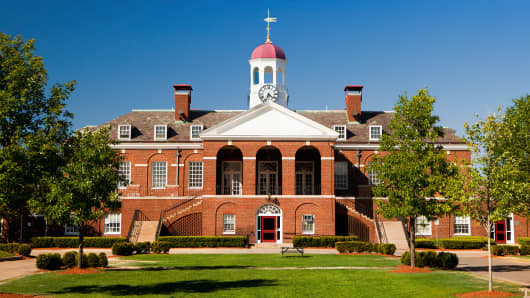Ron Unz over at the American Conservative points out that from the perspective of its balance sheet Harvard looks a lot like a giant, aggressive hedge fund attached to an educational facility for tax purposes.
Each September, Harvard's 6,600 undergraduates begin their classes at the Ivy-covered walls of its traditional Cambridge campus, owing annual tuition of around $37,000 for the privilege, up from just $13,000 in 1990. Thus, over the last two decades, total tuition income (in current dollars) has increased from about $150 million to almost $250 million, with a substantial fraction of this list-price amount being discounted in the form of the university's own financial aid to the families of its less-wealthy students.
Meanwhile, during most of these years, Harvard's own endowment has annually grown by five or 10 or even 20 times that figure, rendering net tuition from those thousands of students a mere financial bagatelle, having almost no impact on the university's cash-flow or balance-sheet position. If all the students disappeared tomorrow—or were forced to pay double their current tuition—the impact would be negligible compared to the crucial fluctuations in the mortgage-derivatives market or the international cost-of-funds index.
A very similar conclusion may be drawn by examining the expense side of the university's financial statement. Harvard's Division of Arts and Sciences—the central core of academic activity—contains approximately 450 full professors, whose annual salaries tend to average the highest at any university in America. Each year, these hundreds of great scholars and teachers receive aggregate total pay of around $85 million. But in fiscal 2004, just the five top managers of the Harvard endowment fund shared total compensation of $78 million, an amount which was also roughly 100 times the salary of Harvard's own president. These figures clearly demonstrate the relative importance accorded to the financial and academic sides of Harvard's activities.
Of course, this argument is not wholly new. Jim Manzi raised it years ago.
But Unz does make a highly original contribution in the form of his suggestion that Harvard auction off at least one admission to the highest bidder each year.
Suppose, for example, that instead of such surreptitious and penny-ante wheeling and dealing, Harvard simply auctioned off a single admissions slot each year to the highest blind bidder on the international markets. I suspect that the same sorts of individuals who currently pay $50 million or $100 million for a splotchy painting they can hang on their walls would surely be willing to spend a similar amount to have their son or daughter embossed with the Harvard stamp of approval. The key factor is that such prestige goods are almost entirely positional in value, with most of the benefit derived from the satisfaction of having outbid your rival Internet billionaires, oil sheikhs, or Russian oligarchs, so the higher the price goes, the more valuable the commodity becomes. And since the goal would be to extract as much money as possible from the wealthy bidders, a non-refundable bidding deposit of 2 percent or 5 percent, win or lose, might double or triple the total dollars raised.
Follow me on Twitter @Carney



